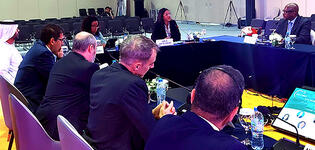Blog
WIDER Alumni Amadou Boly shares wisdom for next generation
Amadou Boly is Special Assistant in the Economic Governance and Knowledge Management Complex at the African Development Bank (ADB). Before that, he was a research fellow and a coordinator of the visitor programme at UNU-WIDER. In this blog, he reflects on his journey since leaving UNU-WIDER and shares some advice for current and future Visiting PhD Fellows.
Currently, I work as Special Assistant to the Vice-President and Chief Economist at the ADB. Before taking this role, I worked in research, including with UNU-WIDER, where I was a research fellow and the coordinator of the PhD fellowship programme.
I still keep in touch with several of the former PhD Fellows and Visiting Scholars from my time at UNU-WIDER. In fact, I just had lunch with one of them in Abidjan recently! The role spurred my passion to be a mentor and leader. Now, as a new cohort of UNU-WIDER PhD Fellows walk the halls of UNU-WIDER, I would like to share some advice to support those coming up after me.
Make the link between research and policy
I have always been interested in how research connects with policy and how dialogue between researchers and policymakers takes place. In my career, I have sat on both sides of the table. I hope the insights I have learned on the way might help others starting out.
Policy action or reform is typically the outcome of many factors and it is difficult to attribute it to any single piece of research or advice. It can be hard to see the outcome of your efforts, but that doesn’t mean you should give up. The most important stage of your research is when you find a way to get it into the hands of those who need it.
To do this, we need dialogue. There are two types of policy dialogue: the direct policy dialogue is when you discuss with policymakers directly in a formal setting such as high-level workshops or seminars or during missions; the indirect policy dialogue is when you conduct analytical work and present policy options through research papers, policy briefs, or reports that are taken on board by policymakers.
In my experience, the indirect and direct policy dialogue are often closely related. For example my research on corruption and tax morale in Africa, which was published in the Journal of African Economics, led to my invitation as presenter and expert to an OECD-ATAF African Roundtable on ‘tax morale, cooperation and trust between MNEs and Tax Administrations’ in April 2021. The roundtable identified a number of policy actions aimed at facilitating a dialogue between businesses and governments for building tax morale, through improving cooperation and mutual trust.
Be a leader, even when you’re not in a leadership position
As the coordinator for UNU-WIDER’s visiting programmes in 2014–15, I found myself needing to take a role as a leader—supervising research and evaluating performance of the visitors. And I loved it, I even took time to go above and beyond helping some visitors in their job seeking, providing general career management advice, reviewing CVs, and writing recommendation letters.
Since that time, I’ve learnt a lot about being a leader, including through a leadership course I took at the beginning of 2023 at Harvard Business School. A key takeaway from this course is the understanding that leadership roles are not only those positions where staff formally report to you. Develop leadership skills because you can be a leader in any position.
In fact, the most important thing about leadership is getting a team to achieve agreed goals, whether the team members report formally to you or not. In this regard, we are all leaders at our level.
Leadership also requires a shift away from being the expert and doing the technical tasks yourself towards empowering others. This can be challenging as your technical skills are what typically bring you to a leadership position in the first place.
Seek bridges to promote good governance
UNU-WIDER is an excellent and vibrant environment for conducting policy-relevant research and I would like to congratulate the new students and visiting scholars on their choice. While wishing them a fruitful stay at UNU-WIDER, I would like to encourage them to continuously seek to create bridges between research and policy to promote good governance and accelerate socioeconomic progress in all parts of the world through bold and innovative ideas.
Amadou Boly is Special Assistant in the Economic Governance and Knowledge Management Complex at the African Development Bank.
The views expressed in this piece are those of the author(s), and do not necessarily reflect the views of the Institute or the United Nations University, nor the programme/project donors.
 Join the network
Join the network


